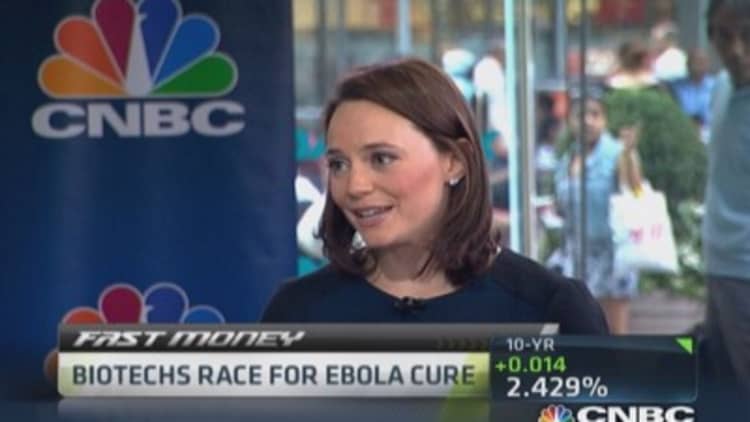Shares of Malaysia's latex glove makers have had a tough year so far, but some analysts expect panic over Africa's Ebola outbreak may spur gains.
"Although all four major gloves manufacturers' exposure to West Africa is minimal, we foresee panic buying of rubber gloves should the Ebola outbreak worsen," with other regions, such as the U.S. and EU, possibly beginning to take precautions, Jerry Lee, an analyst at RHB, said in a note Tuesday.
Read More Ebola outbreak: Is real danger 'epidemic of fear'?
Disease outbreaks can put Malaysia's glove makers in the spotlight, with the country the world's leading supplier of medical gloves, meeting more than 50 percent of global demand, according to the Malaysian Rubber Export Promotion Council.

While the Ebola outbreak is largely confined to West Africa, it has spurred panic in some quarters about whether it could spread as air travel links with the continent have increased in recent years. The latest Ebola outbreak started in March and has been one of the longest on record, with nearly 2,000 total cases and more than 1,000 deaths, according to the U.N.'s World Health Organization (WHO); the virus can have fatality rates of as high as 90 percent and WHO has declared the outbreak an international emergency.
Read More Danger! Beware the side effects of Ebola trading
"We deem this an unpleasant catalyst which could fuel demand for rubber gloves and subsequently remove overcapacity in the market," Lee said, noting that while glove makers have said they haven't seen significant new orders yet, there are more queries in the market.
Every percentage point of increased utilization can increase net profit at Malaysia's "Big Four" glove makers by 1.5-4.3 percent, Lee said, citing the pattern from the 2009-10 breakout of H1N1. He expects Top Glove to be the main beneficiary as its utilization rate is only 70-75 percent, compared with Kossan and Hartalega at 82-88 percent and Supermax at full utilization.
Read More Canada to donate its own Ebola vaccine to WHO
The four companies' stocks are down around 6.7-19.5 percent so far this year, although they've managed to rack up 0.5-3.5 percent gains so far this month.

Others also expect rising glove demand may be on the cards.
"Although the actual increase in glove usage may not be immediate, the public announcement by WHO could further prompt global healthcare awareness and would force hospitals worldwide to stock up on medical supplies, including gloves," Kevin Low, an analyst at Affin Investment Bank, said in a note Monday.
Read More
He is overweight on the sector, noting that gloves are the most affordable form of disease protection.
To be sure, even more capacity is on the way, with the Big Four set to expand nitrile glove capacity by 42 percent on year by the end of 2014, CIMB said in a recent note.
CIMB doesn't expect much of a demand boost.
Read MoreEbola: A closer look at this 'frightening disease'
"Unlike SARS and H1N1 which are transmitted through droplets in the air, Ebola spreads only through bodily secretions," Eing Kar Mei, an analyst at CIMB, said in a recent note. "It will not spread as easily and demand growth will not be as strong as in 2009-10 [H1N1 outbreak] when demand growth for gloves was aided by a low base during the economic downturn in 2008."
But while she maintains a neutral call on the sector, she expects the outbreak could have some long-term positives. "This outbreak should ultimately result in improved health awareness," Eing said in a note dated Sunday.
—By CNBC.Com's Leslie Shaffer; Follow her on Twitter @LeslieShaffer1

